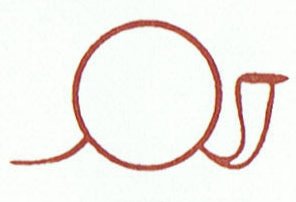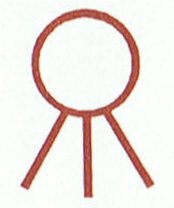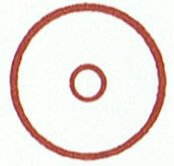6. An embryo is growing with time. The little 'dot' in the center of the 'Sun eye' grows with time. Wilkinson has 3 different Sun hieroglyphs:
The right variant illustrates that the central 'dot' is no dot but a little circle. I guess this triplet of hieroglyphs corresponds to 'soon to be hatched', 'standing high and fully grown', respectively 'inoculated'. As midnight approaches so does the time of birth of a new Sun: 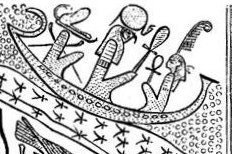 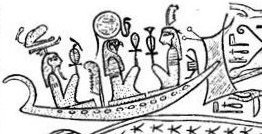 The body of the serpent is an oval with a tail at its back and a head in front. Beyond midnight the outline of a mature 'yolk' informs us that Spring Sun is on his way. It cannot be the beginning of autumn, because the 'embryo' is too big. The Sun boat of spring is travelling on a band of light above the stars. The premidnight Sun boat moves along a string. A 'band of light' defines the oval of Spring Sun and a 'string of night' defines the oval of Autumn Sun. Vai defined by a string should likewise be contrasted with vai defined by a band:
Here I have forced myself to introduce different glyph labels for the pair of variants. I have not been able to rely fully on what Metoro said, but I could see how he used o ako respectively oka a few times (although without any correlation to 'string' respectively 'band').
The digging stick (oka) cannot be the appropriate word in autumn. But to sing (ako) is possible also in the dark. Only later did I discover that this pair of words are mirror images of each other:
I do not think this is accidental, to play games with words must have been a great occupational pastime in the evenings before the electric light had erased the distinctions between day and night. Man needs to sleep only for 8 hours. It is now so long ago - several hundred thousands of years - since the fire was tamed, and during the long interval from that crucial point man has learned to sleep only for 8 hours, instead of following the habit of Sun. Man is awake during ⅔ of the day, conscious and looking around with his eyes. |
